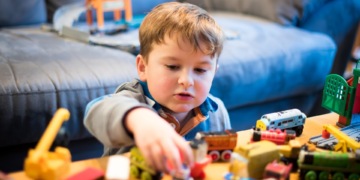We may have different perspectives about cartoons and cognitive development in children, but there is one thing we can all agree on. Cartoons have long been part of childhood delicacies! It’s what we watched when we were young and it’s what we are introducing our children to during infancy.
But, are cartoons ideal or even worthwhile to a child’s cognitive development and how else can they impact infants and children as they grow up?
Key Notes
- The brain develops more from birth to age 5 of one’s life.
- The experiences and the environment we expose our children to during the early years have a lasting impact on their abilities, learning outcomes, and life
- A famous Nasa study indicated that we are born creative geniuses, however, as one grows, one’s creativity diminishes.
- Jaundice in newborns can also lead to weight loss
In this piece of article, we will explore the relationship between cartoons and a child’s cognitive development. We’ll also proceed further to analyze the positive and negative effects of cartoons or animated films on children and what parents ought to do.
The Brain & Cognitive Development During Childhood
The brain (more about child brain development) is one of the largest and most complex organs in the human body. It can be termed as the wheel or a control center of the human body and all the internal processes. Precisely, it’s the brain that controls thought processes, emotions, memory, and hormonal production among other things
As though that isn’t enough, the brain is a power socket for cognitive capabilities in a human and that brings us to the concept of cognition.
Cognition is how one understands the world, everything in it, and how he/she reacts to it. That generally means the mental process of acquiring knowledge and understanding through sight, thought, or experience.
Cognitive development is vital because it is how one perceives, thinks, and understands. Therefore, it is right to say that cognitive development has everything to do with the brain. Precisely, as a child’s brain develops, so should the cognitive abilities.
So, can cartoons aid in a child’s cognitive development?
Cartoons & Cognitive Development
If one never watched Tom & Jerry, Peter Pan, Cinderella, SpongeBob SquarePants, The Smurfs, Little Baby Bum, and Pound Puppies, one may wonder what childhood was like. Cartoons and animated films are part of childhood and that isn’t about to change in many homes.
However, if you’re a concerned mother or new to parenthood, you may wonder whether it’s the best choice to put your child in front of a TV or hand over a tablet to watch cartoons.
First and foremost, cognitive development in infants is a process. One development or achievement leads to another. That’s why it’s natural for mothers to worry when their children can move their eyes as per the surrounding movements, yet the child fails to respond to them, either by shaking their head, waving hands, or squealing.
Singing, talking, and playing with a child are some of the immediate practices mothers can leverage to promote or enhance cognitive development in children. But, can placing an infant in front of a screen to watch cartoons contribute to the same cause?
The obvious answer is that cartoons can benefit a child depending on the age, storyline, and intended purpose.
It should be noted that infants (between 0 and 17 months) can’t draw meaning from whatever they see on the screen. But they can captivate them due to color, sound, and movements.
However, any child above 17 months can benefit from cartoons. Generally, babies can hear and respond to sound right from the womb.
That’s why it is so easy for them to recognize their mother’s voice. But apart from responding to sound, it is essential to help a child learn how to think, reason, focus and draw meaning from the information.

Cartoons can help parents attain various goals, for instance building and supporting specific neuronal networks to help a child learn, pay attention, and memorize information.
Cartoons also enhance physical and psychological stimuli during infancy. So it helps kids develop an open mind, learn, digest, and understand things in reality.
They can also help toddlers perceive colors. It should also be noted that colored moving images capture children’s attention before they even understand the message.
Nowadays cartoons are more interactive and gamified which allows children to learn while having fun. Largely, they can help teach children about life’s dynamics.
Cartoons can also enhance a child’s creativity and imagination capabilities. Cartoons can also enhance a child’s linguistic abilities, reasoning ability, and visual and auditory processing of a child.
Besides, there are some excellent STEM games that use cartoons and animations to introduce young learners to the concepts of STEM for holistic development.
The Con
While cartoons are associated with a range of benefits, they also have a negative aspect. Exposing infants (those below 18 months) to screens can negatively impact their language development and memory. It can also lead to attention and sleep disorders.
When parents fail to monitor their children while watching cartoons or guide them on the type of cartoon to watch, this can lead to poor habits in growing children. These include;
- Poor eating habits
- Behavioral issues
- Foul language
- TV addiction
- Sedentary lifestyles
- Violence among others
Too many hours watching cartoons can also trigger vision issues that may be temporary or otherwise. With that, it’s essential to engage children with better options such as physical interactions to promote cognitive development.
Tips to Deal with the Side Effects of Cartoons
Watching cartoons is inevitable during childhood, however, a parent or a guardian has a major role to play when it comes to screen time in a child’s life. Generally, a parent must get involved to regulate the type of cartoons a child watches and the amount of time they spend in front of a screen.
Apart from that, a parent should avoid exposing an infant (below 18 months) to the screen for extended hours. The best approaches to promote cognitive development during the early stage are;
- Singing to the child
- Reading to the child
- Playing with the child
- Engaging in physical activity games for example dodging the ball
- Solving puzzles
For children above 17 months, they can watch cartoons, but a parent can also engage the child with other activities. For example, drawing, painting, reading, puzzles, and role-playing among others. This helps children to dimensionally benefit from their childhood experiences while promoting cognitive development.
Bottom Line
Cartoons are interesting to watch and they can help keep children busy during their free time. However, there is nothing an infant (below 17 months) learns from watching cartoons. When it comes to children older than that, parents must guide their screen time and the type of cartoons they watch. Ensure to choose cartoons that can teach children colors, cognitive skills, and morals or those that promote EYLF outcomes.
Jessica Robinson loves to write interesting and knowledgeable blogs regarding business management, education and life to satiate the curiosity of her lovely readers. Currently, she is serving as a content manager at the ‘Speaking Polymath’. Every piece of content that she writes demonstrates her immense love and passion for her profession.




























